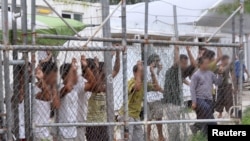The Australian government is facing pressure from the United Nations High Commissioner for Refugees to end its policy of separating refugee families, which the U.N. says has devastating psychological consequences.
Australia has been separating refugee families since 2013 as a way of deterring people from coming by sea to Australia to claim asylum. Under its so-called policy of "offshore processing and deterrence," asylum-seekers are sent to Nauru or Papua New Guinea and are only allowed into Australia for temporary medical reasons.
The U.N. refugee agency says the policy has prevented asylum-seekers from reuniting with their spouses, parents and children in Australia.
UNHCR spokesman Andrej Mahecic says the latest example is a Sri Lankan father who was deported overnight, leaving his 30-year-old partner and their 11-month-old daughter in Australia. Both had been granted asylum last week.
"This latest one goes beyond just the refusal to reunite family but, instead, it is actively and indefinitely separating them," Mahecic said. "… as the relationship with either an Australian permanent resident or a citizen is an eligibility requirement for all family visas, these people are essentially precluded from sponsoring and reuniting with their family members."
The UNHCR reports a number of instances where refugee children have been forced to remain on Nauru, separated from parents who were sent to Australia for medical care. Such separations have devastating mental health consequences, according to the UNHCR.




